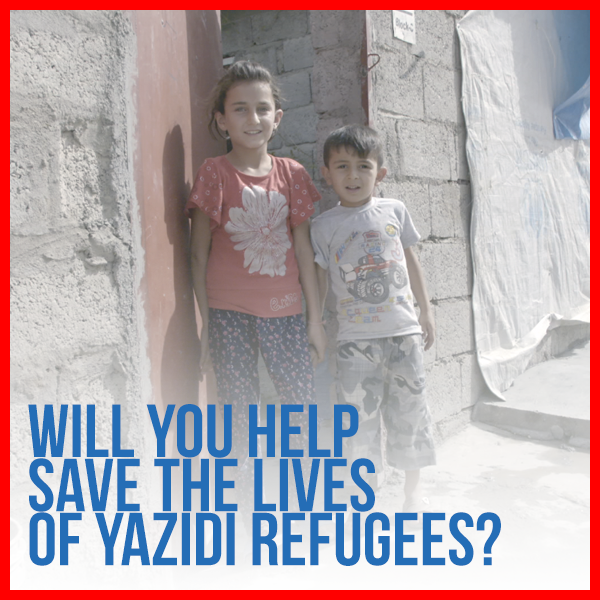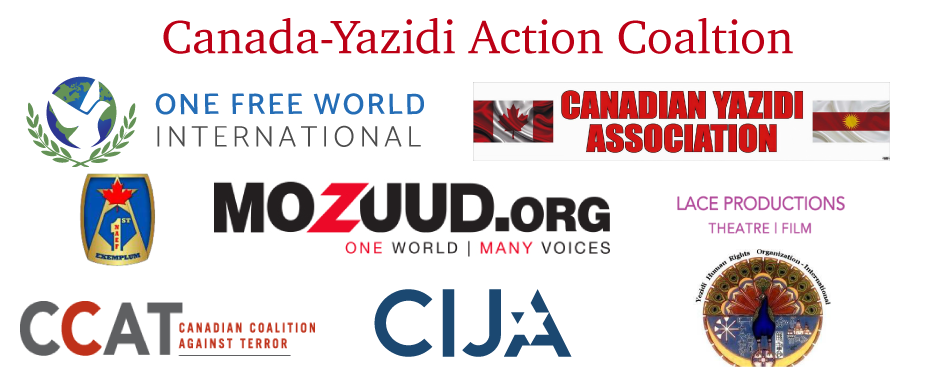The Canada - Yazidi Action Coalition is an assembly of non-profit organizations, private refugee sponsorship groups, religious organizations, and private individuals. Our mission is to advocate for relief, aid, resettlement, and justice for the Yazidi people.

Who are the Yazidi?
The Yazidi are a religious minority of around 700,000 people, concentrated in Northern Iraq, in and around Mount Sinjar and in the Nineveh Plains prior to August 2014. Yazidism is one of the oldest religions in the Middle East, dating back 6,000 years.
What is the conflict and how are nations responding?
On 15 June 2016, the United Nations Human Rights Council (UNHCR) issued its report “They Came to Destroy”: ISIS Crimes Against the Yazidis, which declared Yazidis are victims of genocide and outlined a number of recommendations for the international community. Currently, more than 500,000 Yazidi people are displaced with well over 100,000 in refugee camps, segregated from other refugees because the Yazidi are not safe among them. There have been reports that Yazidi refugees are at risk of attack from those who discriminate against them in the camps in Greece, Turkey, Syria, and even Germany. The Yazidis are effectively one of the most persecuted minorities in the region from all sides.
Canadian Response & Yazidi Canadian Community
In October 2016, the Canadian government adopted a motion in the House of Commons which supported the recommendations in the June UNHCR report, including: using all means available to ensure Yazidis held captive by ISIS in Syria are rescued during on-going military operations, accelerating the asylum applications of Yazidi victims of genocide, and funding and recruiting additional psychosocial support for Yazidi survivors, with increased emphasis on trauma therapy for children.
Tangible Steps the Government and Canadians Can Take to Fulfill Our Moral Obligation to Respond to the Yazidi Genocide
There are a number of ways Canada can do its part to support survivors of the Yazidi genocide. They are outlined below.
1. Building Awareness
- International advocacy on genocide and ongoing challenges faced by the Yazidi people
As a party to the Genocide Convention, Canada can engage with Article 8 of the Convention, and call upon the competent organs of the United Nations, including the Security Council, to take such action under the Charter of the United Nations to prevent and suppress acts of genocide.
An issue frequently heard is that Yazidis are having difficulty with the standard UNHCR refugee process, and, as in the Canadian case, are not being referred for resettlement. Canada should work with its partners in the UNHCR and ask for a review of the refugee resettlement process to ensure that: 1. The most vulnerable are being prioritized. 2. Reports of discrimination by UNHCR staff against religious minorities are fully investigated. 3. Canada advocates to set up a clearly understood reporting system for harassment and crimes committed against the Yazidis in the camps. 4. UNHCR camps are safe places for minorities and steps are taken to root out discrimination against Yazidis in refugee camps and in hosting communities where Yazidis are placed.
- MPs to become personal and vocal advocates
Members of Parliament can use their platforms to speak about the genocide facing Yazidis on social media, during public events, in the House of Commons, during international missions, and locally. The Canada-Yazidi Action Coalition is happy to provide materials to help them if they would like to become personal ambassadors for the cause.
- Capacity-building in the coalition
Individuals and organizations can join the coalition and offer resources so that we can continue our advocacy and broaden our scope. By joining our organization and getting involved, you will demonstrate that Canadians care about protecting and supporting Yazidi victims of genocide.
2. Resettlement of Refugees and Internally Displaced Persons
- Prioritize the resettlement of Yazidi refugees under the GAR program
Canada announced on February 21, 2017 the prioritization of 1,200 refugees in 2017 for the Government Assisted Refugee program in response to the House of Commons motion calling for action. The government has stated vulnerable Yazidi women and children and their families will be resettled. The Government should consult the community and NGOs with experience helping this vulnerable population.
- Lift the cap on PSRs from the Yazidi community
Canada can exempt Yazidi refugees from the mission cap under the privately sponsored refugees program, in order to fully harness the generosity of Canadian private sponsors, who are eagerly waiting for the opportunity to sponsor families using their own resources.
- Work with organizations other than the UN to identify and process refugees
Canada should establish agreements with reputable agencies other than the UNHCR for resettlement referrals, in order to expand the reach of Canada’s program targeting groups facing genocide.
- Work with leaders of the Yazidi community in Iraq to ensure programs are aligned with and achieving desired community goals.
- Work with Yazidi leaders to develop specialized “Return and Rebuild” programs for foreign based aid and relief support.
Canada can show leadership in social-centric aid by working with community and religious leaders directly concerning aspects of resettlement aid programs. Return and Rebuild rely on a two-pronged approach: aid and relief efforts towards integration as well as recovery and reconstruction efforts for post-conflict Yazidi communities. Such programs ease the impacts of population loss due to conflict and conflict mitigation.
3. Conflict Issues
- Canadian government can take leadership on resolving the conflict
Canada should be advocating for the establishment of a safe zone in Northern Iraq with the support of local governments, communities, and the UN for the Yazidi and other minorities, with Canadian leadership performing advisory and capacity building roles.
Canada can take a leadership role by assisting the Yazidi and Kurdish people in developing Disaster Assistance Response Teams, modelled after our own CF DART responders, to assist civilian populations in times of crisis.
Canada should also task a parliamentary committee to clearly define Canadian peace objectives for Iraq, Kurdistan, and the greater Middle East.
4. Humanitarian Support
- Aid for infrastructure, medical support, translation services, re-integration, and replacement/affordable housing.
Canada can take a leadership role in responding to the dire need for aid. It is very clear that Canadians are compassionate and want to know how they can help this cause. The Canadian government can harness this generosity by creating a national project that collects and ships specific items donated by Canadians to support the actual and estimated needs in Iraq, based on current UN identified shortfalls.
There is also a great need for medical relief supplies in hard to reach communities (Yazidi and other minorities) within KRG controlled regions of Northern Iraq. Canada can take a lead role by creating a defined funding pool and shipping support program for projects that provide medical aid supplies and capacity development projects to Yazidi communities.
5. Justice
- Call to action for justice
The Yazidis need justice and accountability. Canada should be using its influence on the international stage to call for the perpetrators of genocide and other atrocities against the Yazidis, and others, to be brought to justice before the appropriate courts.
- Support evidence collections/documentation of genocide
Canada can provide expertise to assist in the preservation and documentation of mass grave sites in Iraq and Syria.

